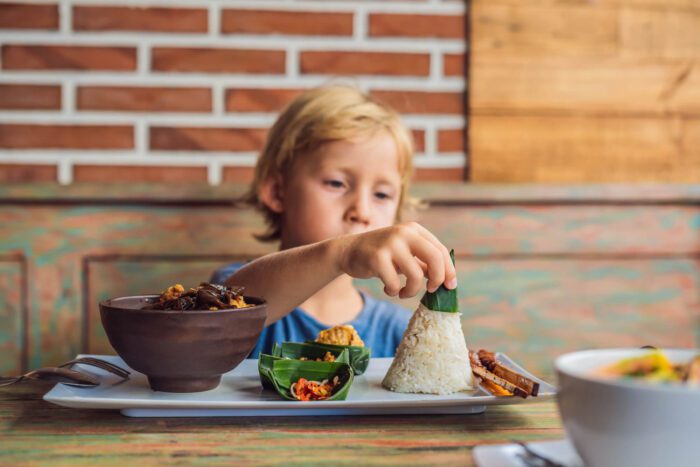While “Bali belly” might sound like a harmless term, it’s actually something you’ll want to steer clear of. It refers to a range of unpleasant gastrointestinal symptoms that travelers can experience while in Indonesia.
Despite the name, Bali belly isn’t limited to Bali alone—you can encounter similar digestive issues on other Indonesian islands too. The term has simply stuck because Bali is the most popular tourist destination, and it’s where many people first encounter this discomfort.
In this article, we’ll explore the causes, treatments, and prevention of Bali belly, helping you avoid it as much as possible so you can fully enjoy your holiday without any unwelcome interruptions.
Causes of Bali Belly
Bali belly isn’t a specific illness, but rather a catch-all term for food poisoning, often resulting from bacterial infections like Salmonella or E. coli. These infections typically occur after consuming contaminated water or food. Locals, who are frequently exposed to such conditions, often build up a certain level of immunity, making them less prone to digestive issues. However, travelers from countries with higher hygiene standards are more susceptible to these problems.

Common Causes:
- Bacterial Infections: Bacteria such as Escherichia coli (E. coli), Salmonella, and Shigella are frequent offenders. These bacteria are commonly found in contaminated water or food and can lead to severe gastrointestinal symptoms like diarrhea, cramps, and vomiting.
- Viral Infections: Viruses like norovirus, which is highly contagious, can also trigger Bali belly. This virus often spreads in areas with low hygiene standards or crowded places like hotels and restaurants.
- Parasites: Parasites such as Giardia lamblia or Entamoeba histolytica can also be culprits. These parasites are found in water or food contaminated with human feces, leading to long-lasting gastrointestinal issues that require specific medical treatment.
- Poor Hygiene: Inadequate hygiene practices, such as not washing hands properly after using the toilet or before meals, greatly contribute to the spread of Bali belly.
Symptoms of Bali Belly
The primary symptoms of Bali belly include diarrhea, abdominal cramps, nausea, and vomiting, which can leave you feeling unwell for several days. These symptoms typically appear within 1 to 10 days after exposure.
Common Symptoms:
- Abdominal pain and cramps: Often accompanied by a bloated feeling.
- Diarrhea: Frequent passing of loose, watery stools.
- Nausea and vomiting
- Mild fever: Usually manifests as a slightly elevated temperature.
- Weakness and malaise
- Loss of appetite
Bali belly often resolves on its own within 24 to 48 hours, but if symptoms persist or become more severe, it’s essential to seek medical attention.
Severe Symptoms:
- Dehydration: Frequent diarrhea and vomiting can lead to dehydration, which is a serious concern. Signs of dehydration include dry mouth, reduced urine output, and, in severe cases, significant health risks.
- Fever: A fever alongside these symptoms may indicate a more serious infection that requires immediate medical care.
- Blood in the stool: The presence of blood in your stool is a red flag that you should seek medical help right away, as it could signify a more severe bacterial or parasitic infection.

Prevention and How to Avoid Bali Belly
Prevention is crucial if you want to reduce the risk of encountering Bali belly on your trip. The following tips can help you minimize the chances of getting sick and ensure your holiday goes smoothly.
Contaminated Water and Ice
Tap water in Bali, as in much of Indonesia, is not safe to drink. While locals often boil it before consumption, as a traveler, it’s best to stick to bottled water, especially in urban areas. It’s also wise to avoid ice in drinks during your first few days, as it may come from untreated water.
Backindo Tip: To avoid accumulating plastic bottles, consider using the RefillMyBottle app, which lists places where you can refill your water bottle for free or for a small fee.
If you have a sensitive stomach, use bottled water for brushing your teeth, rinsing your mouth, or washing fruits and vegetables. Be cautious not to swallow water while showering, especially during the rainy season when water sources can become contaminated.
As in 2023, Bali experienced significant digestive issues among both tourists and locals due to heavy rains that led to flooding and water contamination.
Safe Eating
In tropical climates, bacteria can multiply quickly on food, increasing the risk of food poisoning. However, it would be a shame to miss out on the delicious offerings of Indonesian cuisine, so follow your instincts. Unfortunately, even pricier restaurants don’t guarantee safety from Bali belly—sometimes their kitchens may be in worse condition than street food stalls.
If a stall or restaurant looks questionable or is empty, it’s best to avoid it and look for a place with good reviews or lots of customers.
In general, follow these guidelines:
- Eat at reputable establishments: Choose restaurants with good ratings from other travelers or those recommended by locals.
- Street food: If you want to enjoy local street food, choose stalls with a high turnover, where food looks freshly prepared and hot.
Curious about what street food to try while in Indonesia? Dive into the rich culinary culture by exploring the Best 15 Indonesian Street Foods: A Flavorful Journey Through Local Delights.
If you want to be extra cautious, you can also avoid raw foods like vegetables, fruits, and salads, as they may be washed with contaminated water. However, this is an extreme measure and generally not necessary for most travelers.
And be careful not to overdo it with spicy food, as it can also cause discomfort.
Personal Hygiene
Preventing Bali belly starts with you. Don’t underestimate the importance of personal hygiene. Always wash your hands thoroughly with soap and water before eating and after using the toilet. This is especially important if you decide to try eating the local way—with your hands.
Learn about the dining etiquette in Indonesia. Check out Know the Manners in Indonesia: Do’s and Don’ts Guide for Travelers.
In many non-tourist areas, you might not find soap, or it may be so diluted that its cleaning power is questionable. Therefore, it’s a good idea to carry antibacterial gel and use it frequently.

Treatment for Bali Belly
If you find yourself dealing with Bali belly despite your best efforts to prevent it, follow these guidelines. Most importantly, don’t underestimate the importance of staying hydrated.
Self-Treatment
- Drink plenty of fluids: The first and most crucial step in treating Bali belly is rehydration. Diarrhea and vomiting can quickly lead to dehydration, so it’s essential to drink plenty of bottled water.
- Electrolyte solutions: Replenishing electrolytes is key to maintaining your body’s balance. Products like Pocari Sweat are readily available in stores. Coconut water is another natural way to replenish electrolytes.
Over-the-Counter Medications
- Antidiarrheals: Medications like loperamide, commonly known as Imodium, can help alleviate diarrhea by slowing down bowel movements, leading to firmer stools and fewer trips to the bathroom. However, loperamide should be used cautiously and only when necessary, such as during travel. Long-term use is not recommended as it can lead to constipation.
- Activated charcoal: Another remedy for digestive issues is activated charcoal, which is available in Indonesia under the name Norit. Activated charcoal binds toxins and gases in the intestines, helping to reduce diarrhea and bloating. Like loperamide, it should be used cautiously and according to medical advice or instructions.
- Probiotics: Taking probiotics can help restore the healthy balance of gut bacteria and shorten the duration of diarrhea.
- Pain relievers: Paracetamol or ibuprofen can help alleviate abdominal pain and fever.
When Symptoms Persist
If your digestive issues persist for more than a few days or worsen, it’s important to seek medical attention. In Bali, specialized health services are available for these problems. You can search for “IV drip Bali” or contact Dr. Ari Sudhewa (+628123954567 and +628123924814) or Bali Belly Doctor, who offer door-to-door services. They can visit you, examine your condition, and, if necessary, administer an intravenous (IV) solution for rapid rehydration and treatment.
These services are typically well-equipped to provide immediate help and can significantly alleviate symptoms that can’t be managed with standard home treatment. The cost for this service usually ranges from 500,000 IDR to 1,500,000 IDR.

Diet During Bali Belly
If you feel well enough to eat, opt for light and easily digestible foods:
Recommended Foods:
- Bananas: Rich in potassium, which is essential for replacing electrolytes lost during diarrhea.
- Rice: Helps firm up stools due to its fiber content and reduces the frequency of diarrhea.
- Applesauce or apples: Contain carbohydrates and pectin, which can improve stool consistency.
- Potatoes: Provide carbohydrates and calories, and can also help firm up stools.
- White toast: Easily digestible and ideal without toppings, it provides energy and helps firm up stools.
- Soups and broths: Bone broth or light soups aid in hydration and help replenish lost salts.
Foods to Avoid:
- Dairy products
- Fatty and spicy foods
- Coffee and alcohol
Prevention and Preparation for Your Trip
Many travelers choose to take preventive measures by consuming probiotics before their trip to Indonesia to boost their immune system and reduce the risk of infection. Vaccinations against typhoid and hepatitis A are also recommended, as both diseases are transmitted through contaminated water and food, and prevention can significantly reduce the risk of serious illness.
Conclusion
Bali belly is an unpleasant but relativelly common experience for travelers in Indonesia. While it can disrupt your holiday, knowing how to prevent, recognize, and treat it can make all the difference.
By following the tips outlined in this guide—staying hydrated, eating safely, practicing good hygiene, and knowing when to seek medical help—you can significantly reduce your risk of encountering Bali belly and enjoy your time in this beautiful part of the world. Remember, a little preparation goes a long way in ensuring your trip is as smooth and enjoyable as possible.
FAQ
What should I do if I start feeling the symptoms of Bali belly?
If you start experiencing symptoms like diarrhea, cramps, or nausea, focus on staying hydrated. Drink plenty of bottled water, consider electrolyte solutions, and eat light, easily digestible foods. Over-the-counter medications like Imodium can help manage symptoms, but use them cautiously. If symptoms persist or worsen, seek medical attention.
Can I still eat street food in Indonesia without getting Bali belly?
Yes, you can enjoy street food, but be selective. Choose stalls that are busy with locals, as this often indicates fresher food. Avoid raw foods like salads and opt for dishes that are cooked thoroughly and served hot.
Is it safe to brush my teeth with tap water in Bali or Indonesia?
To minimize the risk of Bali belly, it’s best to use bottled water for brushing your teeth, rinsing your mouth, and washing fruits and vegetables. Tap water in Indonesia is not safe to drink and could potentially lead to gastrointestinal issues.
How long does Bali belly typically last?
Bali belly usually lasts between 24 to 48 hours. However, if symptoms persist beyond this or worsen, it’s important to seek medical attention to rule out more serious infections or complications.
Continue Reading
